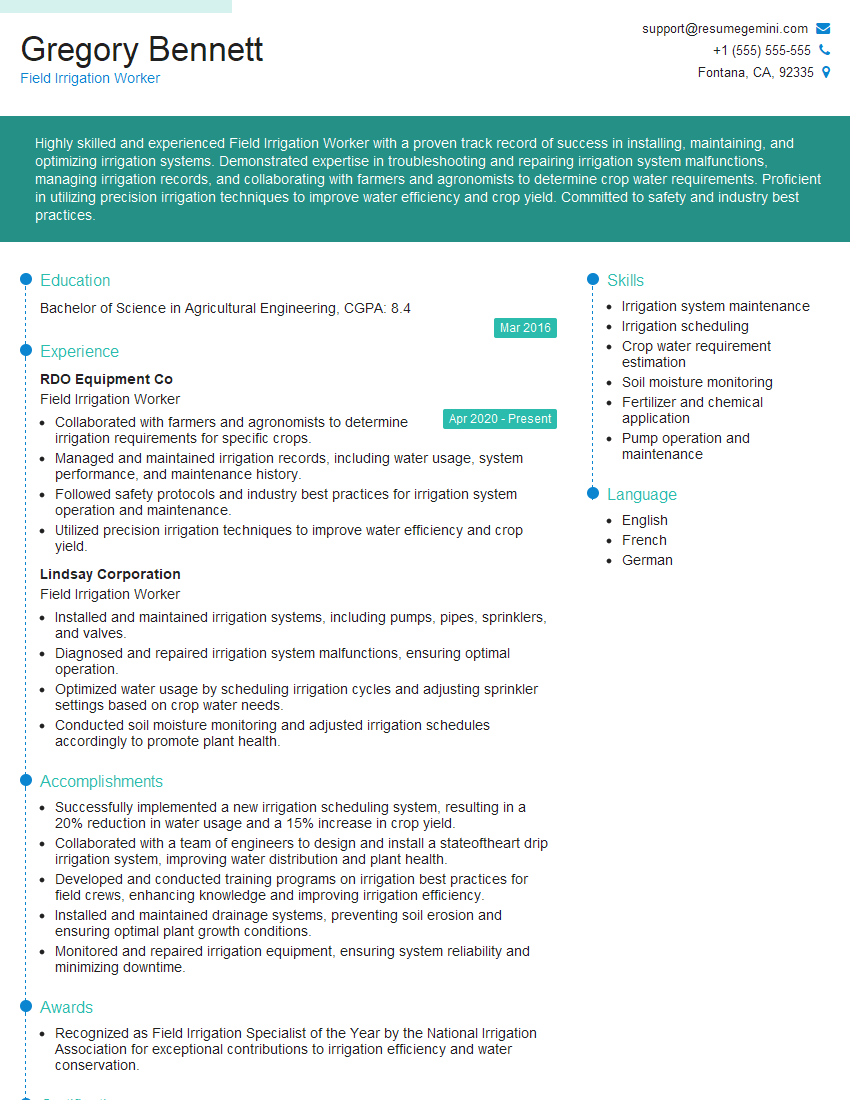Are you a seasoned Field Irrigation Worker seeking a new career path? Discover our professionally built Field Irrigation Worker Resume Template. This time-saving tool provides a solid foundation for your job search. Simply click “Edit Resume” to customize it with your unique experiences and achievements. Customize fonts and colors to match your personal style and increase your chances of landing your dream job. Explore more Resume Templates for additional options.

Gregory Bennett
Field Irrigation Worker
Summary
Highly skilled and experienced Field Irrigation Worker with a proven track record of success in installing, maintaining, and optimizing irrigation systems. Demonstrated expertise in troubleshooting and repairing irrigation system malfunctions, managing irrigation records, and collaborating with farmers and agronomists to determine crop water requirements. Proficient in utilizing precision irrigation techniques to improve water efficiency and crop yield. Committed to safety and industry best practices.
Education
Bachelor of Science in Agricultural Engineering
March 2016
Skills
- Irrigation system maintenance
- Irrigation scheduling
- Crop water requirement estimation
- Soil moisture monitoring
- Fertilizer and chemical application
- Pump operation and maintenance
Work Experience
Field Irrigation Worker
- Collaborated with farmers and agronomists to determine irrigation requirements for specific crops.
- Managed and maintained irrigation records, including water usage, system performance, and maintenance history.
- Followed safety protocols and industry best practices for irrigation system operation and maintenance.
- Utilized precision irrigation techniques to improve water efficiency and crop yield.
Field Irrigation Worker
- Installed and maintained irrigation systems, including pumps, pipes, sprinklers, and valves.
- Diagnosed and repaired irrigation system malfunctions, ensuring optimal operation.
- Optimized water usage by scheduling irrigation cycles and adjusting sprinkler settings based on crop water needs.
- Conducted soil moisture monitoring and adjusted irrigation schedules accordingly to promote plant health.
Accomplishments
- Successfully implemented a new irrigation scheduling system, resulting in a 20% reduction in water usage and a 15% increase in crop yield.
- Collaborated with a team of engineers to design and install a stateoftheart drip irrigation system, improving water distribution and plant health.
- Developed and conducted training programs on irrigation best practices for field crews, enhancing knowledge and improving irrigation efficiency.
- Installed and maintained drainage systems, preventing soil erosion and ensuring optimal plant growth conditions.
- Monitored and repaired irrigation equipment, ensuring system reliability and minimizing downtime.
Awards
- Recognized as Field Irrigation Specialist of the Year by the National Irrigation Association for exceptional contributions to irrigation efficiency and water conservation.
Certificates
- Certified Irrigation Designer (CID)
- Certified Irrigation Auditor (CIA)
- Certified Irrigation Manager (CIM)
- Certified Landscape Irrigation Auditor (CLIA)
Career Expert Tips:
- Select the ideal resume template to showcase your professional experience effectively.
- Master the art of resume writing to highlight your unique qualifications and achievements.
- Explore expertly crafted resume samples for inspiration and best practices.
- Build your best resume for free this new year with ResumeGemini. Enjoy exclusive discounts on ATS optimized resume templates.
How To Write Resume For Field Irrigation Worker
- Use action verbs and quantify your accomplishments whenever possible.
- Highlight your skills and experience in irrigation system maintenance and optimization.
- Demonstrate your knowledge of crop water requirements and best practices for water management.
- Emphasize your ability to troubleshoot and repair irrigation system malfunctions.
- Include any certifications or professional development that you have completed.
Essential Experience Highlights for a Strong Field Irrigation Worker Resume
- Installed and maintained irrigation systems, including pumps, pipes, sprinklers, and valves.
- Diagnosed and repaired irrigation system malfunctions, ensuring optimal operation.
- Optimized water usage by scheduling irrigation cycles and adjusting sprinkler settings based on crop water needs.
- Conducted soil moisture monitoring and adjusted irrigation schedules accordingly to promote plant health.
- Managed and maintained irrigation records, including water usage, system performance, and maintenance history.
- Collaborated with farmers and agronomists to determine irrigation requirements for specific crops.
- Utilized precision irrigation techniques to improve water efficiency and crop yield.
- Followed safety protocols and industry best practices for irrigation system operation and maintenance.
Frequently Asked Questions (FAQ’s) For Field Irrigation Worker
What are the key skills required to be a successful Field Irrigation Worker?
The key skills required to be a successful Field Irrigation Worker include irrigation system maintenance, irrigation scheduling, crop water requirement estimation, soil moisture monitoring, fertilizer and chemical application, pump operation and maintenance, and precision irrigation techniques.
What are the career prospects for Field Irrigation Workers?
Field Irrigation Workers with experience and expertise can advance to supervisory or management positions within irrigation companies or agricultural businesses. They may also pursue specialized roles in irrigation design, water conservation, or precision agriculture.
What are the challenges faced by Field Irrigation Workers?
Field Irrigation Workers may face challenges related to weather conditions, equipment breakdowns, and the need to adapt to changing crop water requirements. They must also stay informed about the latest irrigation technologies and best practices to ensure optimal water management and crop yield.
What are the safety protocols that Field Irrigation Workers must follow?
Field Irrigation Workers must follow safety protocols to prevent accidents and injuries. These protocols may include wearing appropriate protective gear, using equipment safely, and being aware of potential hazards such as electrical wires and water sources.
What are the industry trends that are impacting the role of Field Irrigation Workers?
The use of precision irrigation technologies, such as soil moisture sensors and variable-rate irrigation systems, is becoming more widespread. This trend requires Field Irrigation Workers to have a good understanding of these technologies and how to use them effectively.
What are the personal qualities that make a successful Field Irrigation Worker?
Successful Field Irrigation Workers are typically self-motivated, detail-oriented, and have a strong work ethic. They are also able to work independently and as part of a team, and have excellent communication and interpersonal skills.